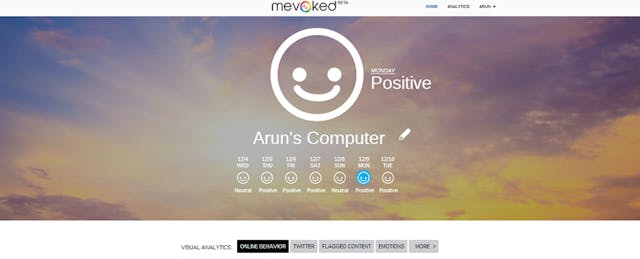When I first heard about an app that could help monitor a child’s mental well-being, I was both curious and skeptical. I don’t know of any other technologies that have their sights on such a big goal, and I consider human relationships and actually being present with children as the best way to know how they are doing.
But Mevoked, founded in February 2013 by Arun Ravi, offers a tool that can do both by helping adults spot early warning signs of mental health issues and address them as they occur.
As a long time teacher and former foster care social worker and counselor, I understand the importance of early intervention for mental health issues. I’ve had numerous encounters when I’ve heard of a tragedy like suicide and listened as family members and friends shared, “I wish I had known something was wrong.”
Ravi felt that way when his friend committed suicide at the age of 13. It impacted him hard, and from that point on he knew he would devote his work to addressing this tragic situation. One thing his friend’s parents--and many others--discovered too late is that kids research different ways to commit suicide. In many instances, kids plan for some time before actually committing the tragic act.
So how does Mevoked aim to intervene?
Mevoked works as a Chrome extension, an observational tool that tracks children’s mood over the course of a day by evaluating their search and browsing history. The tool analyzes the websites they browse, their Tweets, and in the near future, Facebook posts, along with a mobile app, will provide even more data. Based on the content, Mevoked determines whether the child is feeling negative (sad, scared, anxious, angry, or disgust) or positive. The tool then records how frequently the child is feeling these emotions in a dashboard for parents.

The dashboard also displays the positive and negative emotions over the course of a day, further giving parents a tip into whether externally scheduled events (like school or after-school programs) or other issues, such as lack of sleep, may be contributing factors. To dig deeper into the data, parents can click a point on the line for more information. Search terms and Tweets carry heavier weight in overall positive/negative ratings, as they are viewed as more intentional and content rich than casual browsing.
Mevoked’s premium users can dig even deeper into Twitter data with a newly released feature that looks at Twitter and Search as separate buckets. Tweets are analyzed as positive, negative, or neutral as shown below.

Besides overall reports of emotions, another useful tool is the tagging of content that kids are accessing. Parents can view content flagged for sexual, violent, or other inappropriate material and see a link to the source. The alerts are categorized accordingly so parents can look at trends.

As a way to continuously improve the alert reliability, parents can respond to Mevoked if they believe that the content is improperly flagged. They can offer information that may help explain a child’s mental state. For example, parents can tell the system that their children may be depressed because their pet died recently. The more that parents respond back to the tool, the more accurate it can become at providing a longview into a child’s emotional patterns over time.
Mevoked can also push out alerts to children and request that they respond with how they are feeling. Because self-reporting can add to a more comprehensive picture, the platform plans to encourage kids to respond to such prompts with points redeemable for real-life rewards.
Overall, Ravi sees parents as the first line of defense and believes Mevoked can raise early warning flags. He also believes that much of child mental health is in prevention: making sure children are getting adequate sleep, intervening early when a child shows signs of depression or anxiety, and knowing how much time kids are spending online and the types of activities they engage in.
So what about schools?
Ravi believes that Mevoked definitely has a place in schools. While some educators complain that too many sites are blocked in schools, others experience the awkward moments when they discover students accessing inappropriate content. Ravi has talked with countless teachers who report that students access porn and violent material right in class. If teachers and parents can work together to monitor student’s browsing and communication, they can be a powerful force in prevention.
Wish for the future?
My hope for Mevoked is that they are part of a wider set of future tools that promote student awareness and overall mental and physical wellness. With so much research about the importance of sleep and early intervention, perhaps tools like Mevoked can nudge kids to get offline just a tad bit earlier, and get help when they are struggling.
As a preventative tool, Mevoked is one of those cases where if everything goes well, no one notices. If it can stop kids from taking their lives, then Ravi will certainly have achieved an important mission.


